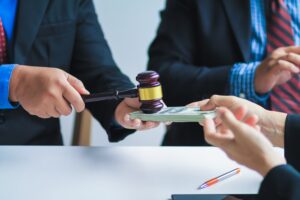Texas slip and fall laws can be complicated and challenging for most injured parties to navigate. slip and fall cases typically involve personal injury claims where an individual has suffered harm due to hazardous conditions on someone else’s property. Determining liability can be difficult as it generally requires establishing that the property owner was aware of the dangerous condition and failed to take reasonable steps to address it.
The injured person must also demonstrate that they exercised reasonable caution and did not contribute to their own slip and fall. Given the details involved, those injured in Texas slip and fall accidents should seek legal advice from an experienced personal injury attorney who can guide them through the legal process, gather evidence, and build a strong case. Contact a Texas slip and fall attorney near you to protect your rights and seek the compensation you deserve.
Schedule A Free Case Consultation
Table of contents
- Understanding Slip and Fall Accidents in Texas
- The Role of Negligence in Slip and Fall Cases
- Invitees, Licensees, and Trespassers
- Common Causes of Slip and Fall Accidents
- The Statute of Limitations for Slip and Fall Cases in Texas
- Potential Damages in Slip and Fall Claims
- Potential Liable Parties in Slip and Fall Cases
- Seeking Legal Representation
- Are You Ready to Pursue Your Rights to Compensation Under Texas Slip and Fall Laws? Contact a Texas Personal Injury Attorney Today
Understanding Slip and Fall Accidents in Texas

Slip and fall accidents can occur in various settings, such as retail stores, restaurants, hotels, or private residences. These accidents can lead to severe injuries, including broken bones, head trauma, spinal cord injuries (SCI), and more. In Texas, slip and fall cases come under the purview of premises liability law.
Premises liability law holds property owners responsible for maintaining safe conditions for visitors. When a slip and fall accident occurs, the injured party may be eligible for compensation if they can prove that the property owner’s negligence contributed to their injuries. However, note that not all slip and fall accidents automatically result in a successful personal injury claim. Establishing liability in these cases can be challenging, and that is where the skill of a Texas personal injury attorney becomes essential.
The Role of Negligence in Slip and Fall Cases
Proving negligence is an essential aspect of a slip and fall case. To establish negligence, the injured party must show that the property owner failed to exercise reasonable care in maintaining the premises or failed to warn visitors about known hazards. It requires demonstrating the following elements:
- Duty of Care: The property owner owed a duty of care to visitors, ensuring they were reasonably safe on the premises.
- Breach of Duty: The property owner breached their duty of care by creating a hazardous condition or failing to address known hazards.
- Causation: The hazardous condition directly caused the slip and fall accident.
- Damages: The injured party suffered damages, such as physical injuries, medical expenses, pain and suffering, and lost income.
Proving these elements can be challenging, as it requires gathering evidence, interviewing witnesses, and conducting a thorough investigation. This is where the skills of a Texas personal injury lawyer become invaluable.
Invitees, Licensees, and Trespassers
When it comes to slip and fall accidents, understanding the legal status of the injured individual is imperative. In Texas, the law categorizes individuals as invitees, licensees, or trespassers. Here is a closer look at each category:
Invitees
Invitees are individuals who are on the property for the property owner’s benefit, such as customers at a grocery store or clients at a business establishment. Property owners owe invitees the highest duty of care, which means they must take reasonable steps to ensure the premises are safe and free of hazards.
If an invitee suffers an injury due to a hazardous condition on the property, the property owner may be held liable for the injuries. However, the injured party must prove that the property owner knew or should have known about the dangerous condition and failed to take appropriate action.
Licensees
Licensees are individuals who are on the property with the owner’s permission but for their own purposes, such as social guests. Property owners have a duty to warn licensees of any dangerous conditions that may exist on the property, but they are not required to actively inspect the premises for potential hazards.
If a licensee suffers an injury due to a dangerous condition on the property and the property owner was aware of the condition but failed to provide adequate warning, the injured party can pursue a premises liability claim.
Trespassers
Trespassers are individuals who are on the property without the permission or knowledge of the property owner. Property owners generally owe no duty of care to trespassers except for intentionally causing harm or creating dangerous conditions intending to harm trespassers.
However, suppose a property owner is aware of frequent trespassers, especially children. In that case, they may be required to take reasonable steps to prevent harm, such as securing a swimming pool or dangerous equipment.
Property owners in Texas are expected to:
- Keep their premises in a safe condition
- Correct or warn about any hazardous conditions
- Regularly inspect the property for potential dangers
- Exercise reasonable care to prevent slip and fall accidents
Understanding the legal status of the injured party is imperative in a slip and fall case, as it determines the level of duty of care owed by the property owner.
Common Causes of Slip and Fall Accidents
Slip and fall accidents can occur due to various hazards or dangerous conditions on a property. Some common causes include:
Wet or Slippery Surfaces
One of the most common causes of slip and fall accidents is wet or slippery surfaces. It can be due to spills, leaks, or recently mopped or waxed floors. Property owners are responsible for cleaning up spills promptly or placing warning signs until the area is safe.
Uneven Surfaces
Uneven surfaces, such as cracked sidewalks, broken floor tiles, or potholes, can also lead to slip and fall accidents. Property owners should repair these hazards or mark them with proper warnings until they can be fixed.
Poor Lighting
Inadequate lighting can make it difficult to see potential hazards, increasing the risk of slip and fall accidents. Property owners should ensure proper lighting in all areas to prevent accidents.
Lack of Handrails or Guardrails
Staircases and elevated areas without handrails or guardrails can pose a significant risk to visitors. Property owners must install and maintain proper handrails or guardrails to prevent falls.
Schedule A Free Case Consultation
The Statute of Limitations for Slip and Fall Cases in Texas
In Texas, slip and fall victims must file a personal injury lawsuit within a certain time frame, known as the statute of limitations. The statute of limitations sets the deadline for initiating legal action, beyond which a victim may lose their right to seek compensation. In Texas, the statute of limitations for slip and fall cases is generally two years from the accident date. However, there are certain exceptions and circumstances that may alter this time frame. You will want to consult with a personal injury attorney promptly to ensure you meet all necessary deadlines and protect your right to compensation.
Potential Damages in Slip and Fall Claims
When you sustain injuries in a slip and fall accident, you may be entitled to various types of damages. Damages refer to the compensation you can receive to cover the physical, emotional, and financial losses you have endured due to the accident. Some potential damages in slip and fall claims include:
- Medical Expenses: Slip and fall accidents can result in severe injuries that require medical treatment. Damages can cover medical bills, hospital stays, surgeries, prescription medication, rehabilitation therapy, and other related medical expenses.
- Lost Income: If your slip and fall accident leaves you unable to work or requires you to take time off for medical treatment, you may be entitled to compensation for lost income. It includes both the income you missed out on during your recovery period and any future earnings you may lose due to a disability caused by the accident.
- Pain and Suffering: Slip and fall accidents can cause physical pain, emotional distress, and a diminished quality of life. Damages for pain and suffering aim to compensate you for the mental and physical anguish you have endured as a result of your injuries.
- Property Damage: In some cases, a slip and fall accident may result in damage to personal belongings, such as a broken phone or eyeglasses. Damages can include the cost of repairing or replacing these items.
- Loss of Consortium: If your slip and fall accident has affected your relationship with your spouse or family members, you may be eligible for damages for loss of consortium. These damages compensate for the negative impact the accident has had on your ability to maintain a normal and loving relationship.
It’s important to note that every slip and fall case is different, and the damages you may be entitled to will depend on the specific circumstances of your case. Consult a skilled Texas personal injury attorney to assess the potential damages you can pursue.
Potential Liable Parties in Slip and Fall Cases
In slip and fall cases, there may be multiple parties who can be held liable for the injuries suffered. Depending on the circumstances of the accident, potential liable parties may include:
- Property Owners: The owner of the premises where the slip and fall occurred may be held responsible for maintaining the property and ensuring its safety.
- Property Managers: If the property is managed by a third party, such as a property management company, they may share liability for any negligence in maintaining the property.
- Contractors and Maintenance Companies: If the property owner hired contractors or maintenance companies to perform repairs or maintain the property, they may be held liable for any negligence on their part that contributed to the accident.
- Government Entities: If the slip and fall occurred on public property, such as a sidewalk or park, a government entity may be held responsible for any negligence in maintaining the area.
Be sure to consult with a seasoned Texas slip and fall lawyer who can conduct a thorough investigation and determine all potentially liable parties.
Seeking Legal Representation
Understanding slip and fall laws in Texas requires an in-depth understanding of the legal system. To ensure your rights are protected, and you have the best chance of obtaining fair compensation, seek legal representation from an experienced Texas personal injury attorney. Your attorney will guide you through the legal process, gather evidence, negotiate with insurance companies, and build a strong case for compensation on your behalf.
When choosing a personal injury lawyer, look for someone with a proven track record in handling slip and fall cases. They should have a deep understanding of premises liability law, extensive experience in negotiation and litigation, and a commitment to fighting for their clients’ rights. Don’t hesitate to schedule consultations with multiple slip and fall attorneys to find the one who best suits your needs and can provide the representation you require.
A personal injury lawyer well-versed in slip and fall cases will:
- Investigate the accident thoroughly, gathering evidence to establish liability.
- Consult with expert witnesses, such as accident reconstruction specialists or medical professionals, to strengthen your case.
- Clearly communicate and negotiate with insurance companies on your behalf.
- Calculate the full extent of your damages, including current and future medical expenses, lost income, pain and suffering, and other related losses.
- Prepare your case for trial if a fair settlement cannot be reached.
By enlisting the help of a skilled personal injury attorney, you can level the playing field and increase your chances of securing the compensation you deserve.
Are You Ready to Pursue Your Rights to Compensation Under Texas Slip and Fall Laws? Contact a Texas Personal Injury Attorney Today

Slip and fall accidents can have devastating consequences, leading to injuries and financial hardship for the victims. Understanding Texas slip and fall laws is necessary for those seeking compensation for their injuries. By consulting with a personal injury attorney, you can understand these laws and how they apply to your case, establish liability, and fight for the compensation you deserve.
Remember, seeking legal advice from a Texas personal injury attorney should be a priority if you or a loved one has suffered an injury in a slip and fall accident. Contact an attorney near you to protect your rights and seek the compensation you deserve. Don’t wait—reach out today and take the first step towards securing the justice and compensation you need.
